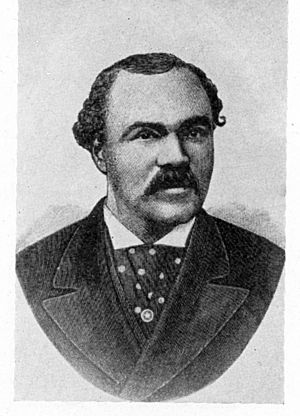Thomas Bowers (singer) facts for kids
Quick facts for kids
Thomas J. Bowers
|
|
|---|---|
 |
|
| Background information | |
| Birth name | Thomas J. Bowers |
| Born | c. 1823 Philadelphia, Pennsylvania |
| Died | October 3, 1885 Pennsylvania |
| Occupation(s) | Concert artist |
| Years active | 1854–85 |
Thomas J. Bowers (born around 1823, died October 3, 1885) was a famous American concert singer. People sometimes called him "The Colored Mario" because his voice was so amazing. He learned to sing from another talented African-American singer, Elizabeth Taylor Greenfield. Thomas first toured with her group, then started his own very successful singing career.
Thomas was also the brother of two other notable people. His sister, Sarah Sedgwick Bowers, was a professional singer known as "the Colored Nightingale." His brother, John C. Bowers, was a businessman and church organist in Philadelphia. A TV show called Bonanza even featured a story about Thomas Bowers in 1964. Actor William Marshall played him in the episode.
Contents
Thomas Bowers' Early Life
Thomas Bowers was born in Philadelphia, Pennsylvania, around 1823. His father, John C. Bowers, Sr., was a clothing dealer. He was also a leader at the African Episcopal Church of St. Thomas. His father helped start the Pennsylvania Anti-Slavery Society, a group that worked to end slavery. Thomas's mother was named Henrietta.
From a young age, Thomas loved music. His older brother, John, taught him to play the piano and organ. When Thomas was 18, he took over from his brother as the organist at St. Thomas African Episcopal Church. Thomas and his brother also worked as tailors. They had a popular shop where they made clothes for gentlemen in Philadelphia.
Becoming a Concert Artist
Thomas Bowers loved music and singing, but his parents wanted him to sing only in church. He turned down chances to sing with famous groups, like Frank Johnson's Band. However, more and more people heard his beautiful voice.
In 1854, he was convinced to sing at a concert in Philadelphia with Elizabeth Taylor Greenfield. He then became her student. This performance was a huge success! Critics praised his voice, calling him "The Colored Mario" or "The American Mario." They said his voice sounded like the famous Italian opera singer Giovanni Mario. Thomas didn't like the nickname, but he agreed to be called "Mareo" for his shows.
After that, Thomas toured with Greenfield's group. They performed in Philadelphia, the Midwest, New York, and Canada. Later, he started his own solo career, which was very successful.
Thomas's Singing Style
Thomas Bowers was known for singing romantic ballads and popular songs from operas. People described his voice as having "wonderful power and beauty." They also said it was "extraordinary, mellow, and sweet." He could sing almost two octaves, which is a wide range of notes. People also said he was handsome and had a strong presence on stage.
Fighting for Equality
Thomas Bowers used his singing career to speak out against racial inequality. He was hesitant to become a public singer at first. But he realized he could show the world that Black men and women could sing classical music just as well as anyone else. He wanted to prove wrong those who made fun of Black performers.
He became famous for refusing to sing for audiences that were segregated or only for white people. In 1855, he was supposed to perform in Hamilton, Ontario. But the theater manager would not let six Black people sit in the good seats they had paid for. Thomas Bowers refused to sing that night.
Writer James Monroe Trotter noted that Thomas sang in many Eastern and Middle States. He even performed in Maryland, where slavery was still allowed. Newspapers there had to admit he was a very talented singer.
Thomas Bowers also sang at special concerts to raise money. These funds helped recruit Black soldiers for the Union Army during the Civil War. These soldiers trained at Camp William Penn.
Other Important Activities
Thomas Bowers and his family were active in fighting for civil rights. They helped organize Black people to oppose the unfair fugitive slave laws of the 1850s. These laws made it harder for enslaved people to escape to freedom. Thomas also represented Pennsylvania at the Equal Rights Convention. In October 1864, he was a delegate from Philadelphia at the National Convention of Colored Men in Syracuse, New York.
Personal Life
Thomas Bowers married Lucretia Turpin, who was from New York, before 1850. They had one daughter named Adelia.
When Thomas died in 1885, he owned a good amount of property. He had nearly $10,000 in real estate, stock in the Pennsylvania Railroad, household items, and money in the bank.
Bonanza TV Episode
In 1964, the popular TV show Bonanza had an episode called "Enter Thomas Bowers." In this episode, actor William Marshall played Thomas Bowers, showing him as an African American opera singer.
 | Anna J. Cooper |
 | Mary McLeod Bethune |
 | Lillie Mae Bradford |

